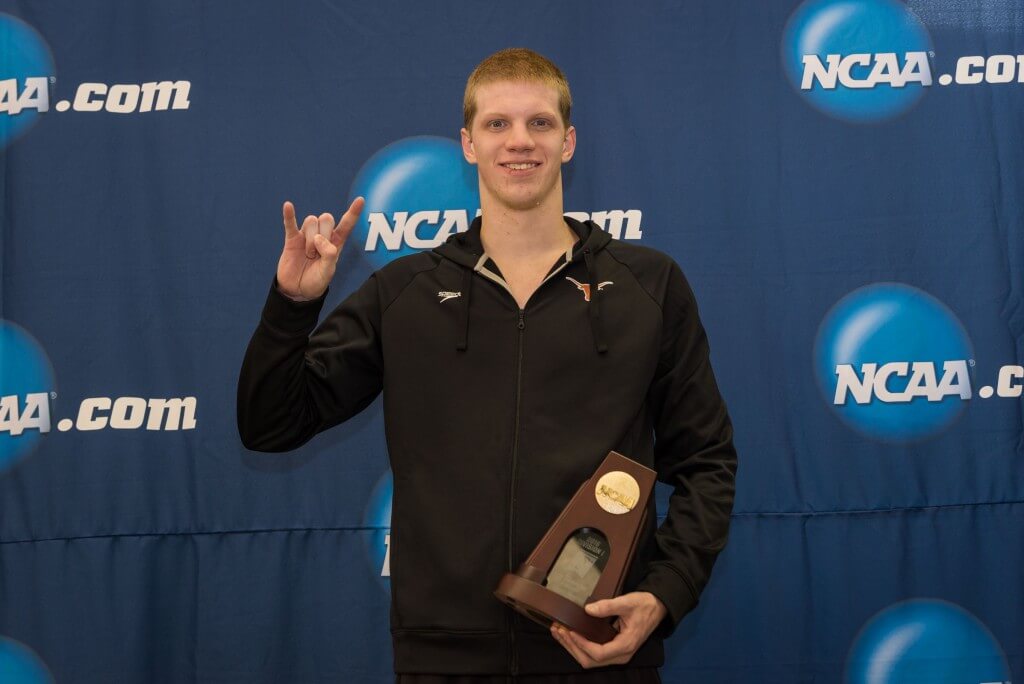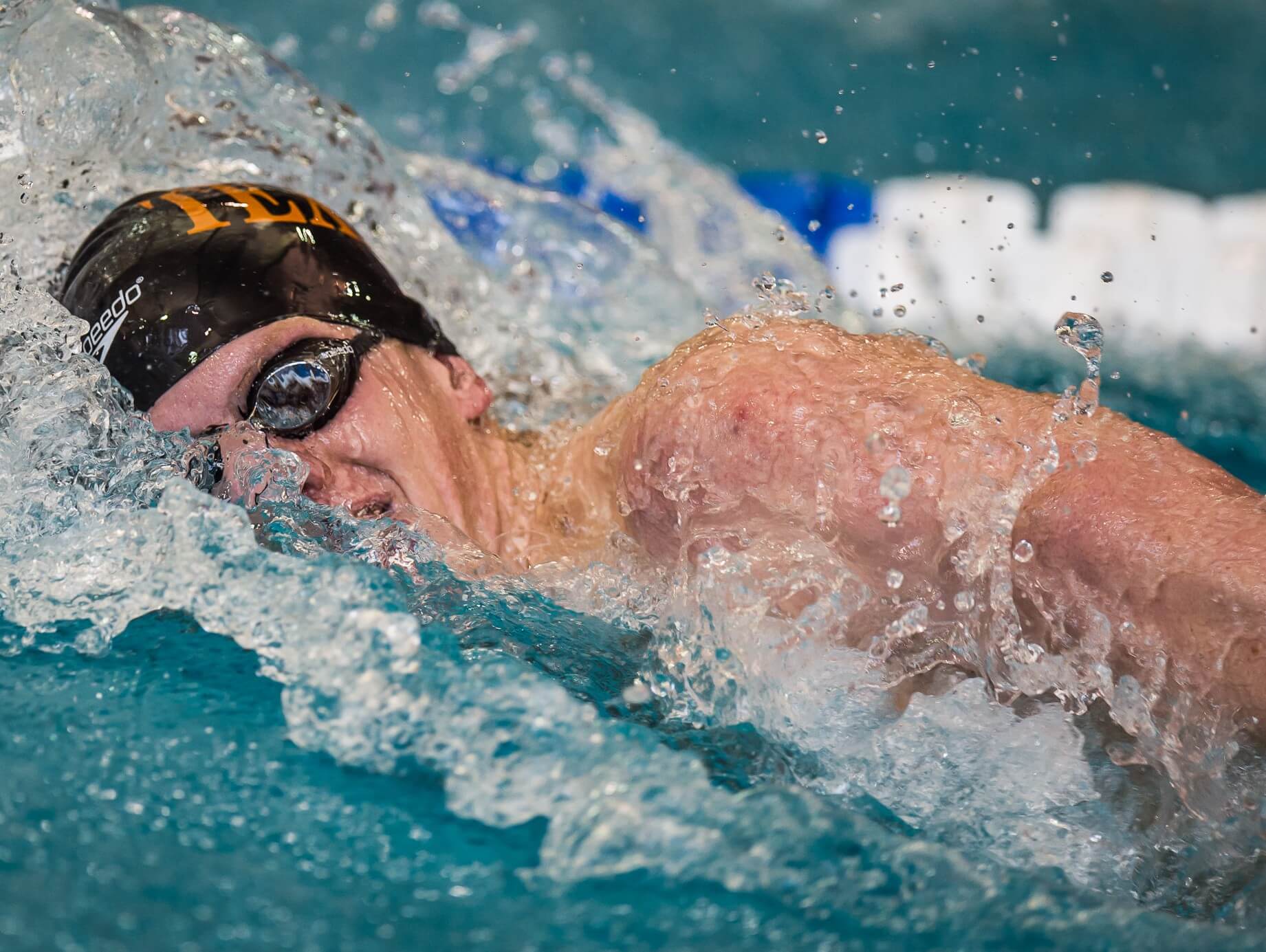NCAA Swimming Flashback: Townley Haas Breaks Decade-Old Record in Stunning Freshman Performance

Editorial content for the 2022 NCAA DI Men's Swimming & Diving Championships coverage is sponsored by Swiss Timing.
See full event coverage.
Follow Swiss Timing on Instagram at @omega #OMEGAOfficialTimekeeper

NCAA Swimming Flashback: Townley Haas Breaks Decade-Old Record in Stunning Freshman Performance
The record had stood for a decade, the sort of mark that appeared it would never be broken. At the 2006 NCAA Championships, Arizona’s Simon Burnett had recorded a 1:31.20 in the men’s 200-yard freestyle. He crushed the U.S. Open record held by Michael Phelps, who at that point was the only swimmer to ever swim under 1:33. Burnett’s record was so far ahead of his time that only once in the next six NCAA Championships would the winner swim under 1:32, and that was during the polyurethane suit era of 2009.
In 2009, the likes of Shaun Fraser and U.S. Olympians Dave Walters and Ricky Berens each took their shots at the record, only to max out in the 1:31.7-range. Four years after that, Louisville’s Joao de Lucca won the NCAA title in 1:31.51, just three tenths off the record, while Berens broke the American record with a 1:31.31, just 0.11 short of Burnett’s lofty standard. But by 2015, the event had slowed down again, with USC’s Christian Quintero winning the national title in 1:32.03 and only one other swimmer breaking 1:33.
All that changed in 2016 when Townley Haas arrived at his first NCAA Championships. Haas had been a top-ranked recruit out of Richmond, but he had not yet seriously entered the national conversation prior to that meet. He was seeded third in the 500 free and ninth in the 200 free when he arrived in Atlanta, but his profile and the trajectory of his career changed on day one.
For the first time, the 800 freestyle relay was held Wednesday night, before the three full days of competition, and Texas swam the fastest time in history while winning by a second-and-a-half. The relay consisted of three returning stars from the 2015 Texas title team, Jack Conger, Clark Smith and Joseph Schooling, plus Haas — and it was Haas who laid down the fastest split in the field by more than a second and the fastest split ever at 1:30.52.

Townley Haas at the 2016 NCAA Championships — Photo Courtesy: Peter H. Bick
The chatter started: could this 19-year-old be the one to take down the U.S. Open record, the one that had survived challenge after challenge for a decade? The next day, Haas led wire-to-wire in the 500 free final as he claimed his first individual NCAA crown. Then, he qualified second for the 200 free final, his time of 1:32.45 already crushing his existing flat-start lifetime best of 1:33.19.
And in the final, Haas went crazy. He went out in 20.90 and 43.61, eight tenths ahead of the field and well ahead of Burnett’s U.S. Open-record pace. He touched in 1:30.46, even quicker than his eye-opening relay performance from two days earlier, and he annihilated the record by three-quarters of a second. The record that had lasted for 10 years.
Haas would go on to conclude the meet by finishing fourth in the 1650 freestyle as Texas secured its second straight national title, and also on that final day, USA Swimming National Team Director Frank Busch mentioned Haas’ name as a contender in the mid-distance freestyle events at Olympic Trials. Haas looked like a candidate to surprise the established favorites and sneak onto the team in at least an 800 free relay spot and possibly more.
Instead, after finishing third and missing the Olympic team by just four tenths in the 400 free, Haas won the 200 free. He touched out 2012 Olympian Conor Dwyer by one hundredth, with Texas teammate Conger another tenth behind and superstar Ryan Lochte finishing in fourth.
At his first Olympics, Haas would qualify for the individual 200 freestyle final, where he finished fifth, and a day later, he helped the United States secure Olympic gold on the 800 free relay, where his 1:44.14 split was the quickest in the entire field of 32 swimmers.
In 2017, Haas would bolster his résumé with an individual silver in the 200 free at the World Championships, and he has consistently been one of the best 200 freestylers in the country since. Haas is now the veteran among a pack of American 200 freestylers in their early 20s, but it was only six years ago that he was the young scorcher, the man who did not let a decade of others’ frustration prevent him from knocking off a legendary record.




.png)